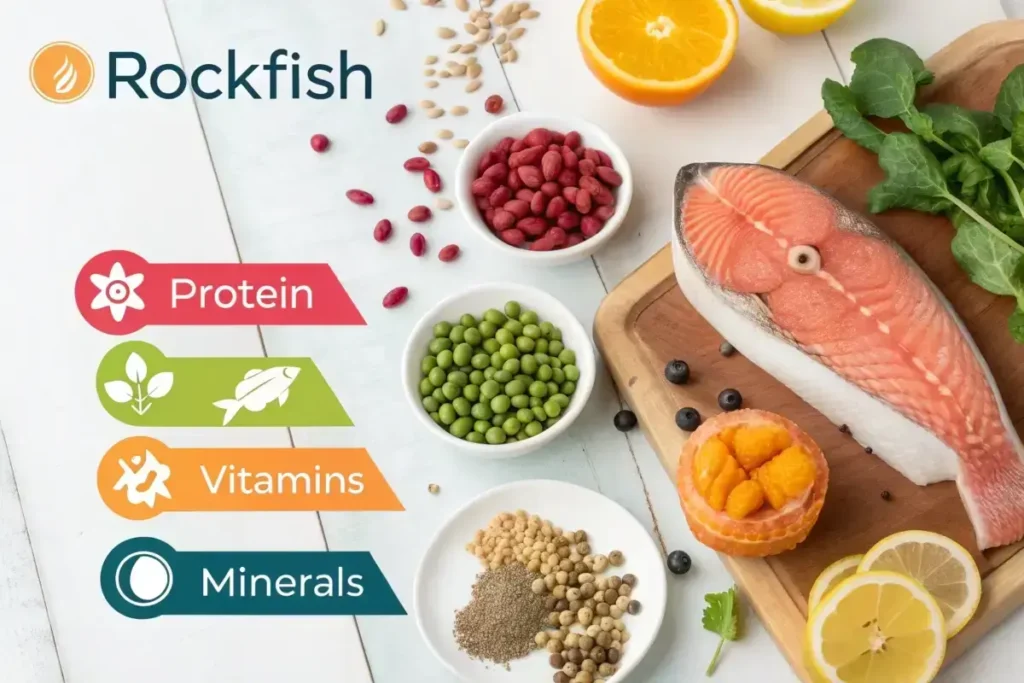When it comes to choosing seafood, many people wonder, “Is rockfish a good fish to eat?” This popular fish has gained attention for its mild flavor and versatile cooking options, but there’s much more to consider. From its nutritional benefits to sustainability practices, understanding the ins and outs of rockfish can help you make an informed choice. Whether you’re a seafood lover or a curious newcomer, you’ll soon discover why rockfish deserves a place on your plate.
Table of Contents
Nutritional Profile
When it comes to nutrition, rockfish checks quite a few boxes. Let’s break it down!
Nutrition Facts
| Nutrient | Per 100g |
|---|---|
| Calories | 90 calories |
| Protein | 19 grams |
| Total Fat | 1.0 grams |
| Saturated Fat | 0.3 grams |
| Cholesterol | 60 mg |
| Sodium | 65 mg |
| Omega-3 Fatty Acids | 0.3 grams |
| Vitamins (D, B6) | 20% DV |
| Minerals (Calcium, Iron) | 1% DV |
Is your mouth watering yet? If not, hang tight! Rockfish packs a surprising nutritional punch that can benefit your health in various ways.
Vitamins and Minerals in Rockfish
Is rockfish a good fish to eat? Absolutely! One reason many people consider rockfish a great choice is its rich content of essential vitamins and minerals. This fish contains vitamin D, which is vital for bone health and can help elevate your mood. Ever heard of “the sunshine vitamin”? That’s right—rockfish is an excellent source! Additionally, it has vitamin B6, known for aiding brain health. Toss in some iron and calcium, and it’s clear why rockfish is recommended as a nutritious option.
These nutrients act like the superheroes of the diet world. They fight fatigue, boost your immune system, and keep your hair and skin looking fabulous! Plus, rockfish is low in calories, making it an excellent option for those wondering, “Is rockfish a good fish to eat?” while watching their weight.

Protein Content and Its Benefits
When pondering the question, “Is rockfish a good fish to eat?” it’s important to note that rockfish is notably high in protein. With around 19 grams of protein per 100 grams, this fish can be your go-to option for muscle repair and growth. Protein is a game-changer for anyone leading an active lifestyle, and incorporating rockfish into your diet can help meet those needs.
Imagine rockfish as a personal trainer on your plate. It not only supports muscle building but also keeps you feeling full and satisfied. So, whether you’re a gym enthusiast or just trying to keep your energy levels up throughout the day, rockfish could be the protein-packed fuel you’ve been looking for when questioning, “Is rockfish a good fish to eat?”
Flavor Profile: What Does Rockfish Taste Like?
So, how does rockfish taste? Great question! If you expect a burst of flavors, rockfish might surprise you in a delightful way.
Texture and Culinary Versatility
When cooked right, rockfish has a mild, sweet flavor combined with a firm, flaky texture. It’s like the blank canvas of the seafood world, just waiting for your culinary masterpiece. Whether you grill it, bake it, or fry it, rockfish adapts beautifully to various seasonings and sauces.
You could say choosing rockfish is like picking the perfect outfit. It can shine solo or can be styled with accessories—like herbs, spices, and marinades. Imagine a lemon-garlic butter sauce drizzled over a perfectly grilled rockfish; it’s mouthwatering, isn’t it?
Culinary Uses and Popular Recipes Using Rockfish
With such a delightful flavor profile, rockfish often finds its way into various dishes. Let’s explore some fun and delicious ways to enjoy it!
Grilled Rockfish: Tips and Tricks
Grilling rockfish is a crowd favorite, and it couldn’t be easier! Simply season the fish with salt, pepper, and your favorite spices—paprika adds a nice smoky touch. Preheat your grill, place the fish on the grates, and let the magic unfold.
Pro Tip: Always place the rockfish skin-side down first to prevent sticking and lock in moisture. Grill for about 4-5 minutes per side until the flesh is opaque and flakes easily with a fork. The result? A perfectly juicy and flavorful rockfish that’s irresistible!
(Want more ways to cook rockfish? Check out our Rockfish Recipes Guide for more delicious ideas!)
Baking Rockfish: A Simple Recipe
If you’re not in the mood to grill, baking is an equally fantastic option. Just preheat your oven to 400°F (200°C), and coat the fish with olive oil, salt, and herbs like parsley or dill. Bake it for about 15-20 minutes, and voilà! You’ve got a delectable dish ready to serve.
But here’s the golden nugget: for an extra flavor twist, top your rockfish with some tomatoes and feta cheese before baking. The flavors meld together beautifully, creating a dish that’s hard to resist.
Rockfish Tacos: A Flavorful Option
Who doesn’t love tacos? Rockfish tacos are a fantastic choice for a casual dinner, and they’re incredibly easy to prepare! Simply pan-sear the fish, flake it into bite-sized pieces, and tuck it into warm corn tortillas. Top it off with shredded cabbage, diced avocado, and a squeeze of fresh lime for a burst of flavor.
Love experimenting with different types of seafood? You might also enjoy calamari, a versatile ingredient used in many cuisines. Learn more about what calamari is made of and how to cook it here.
The combination of flavors in these tacos? Absolutely incredible—like a fiesta in your mouth!
Sustainability: Is Rockfish a Sustainable Choice?
As we become more aware of our impact on the environment, it’s crucial to look at not just what we eat but also where it comes from. So, is rockfish sustainable? The answer may depend on the specific type and where it’s caught.
Fishing Practices and Environmental Impact
Many rockfish species are considered vulnerable due to overfishing and habitat destruction. Thankfully, there are responsible fisheries that prioritize sustainable practices. The key is to look for rockfish that are caught using methods that minimize bycatch (the unwanted fish caught while targeting a different species).
Pro Tip: Always check for sustainability certifications! Look for labels like the Marine Stewardship Council (MSC) or the Aquaculture Stewardship Council (ASC) when buying rockfish. These labels indicate that the fish are sourced from well-managed fisheries or responsible farms, ensuring a lower environmental impact.
Why should this matter to you? Choosing sustainably sourced seafood not only helps protect marine life but also supports the livelihoods of fishermen who follow best practices. It’s like giving a high-five to the ocean!
Certifications to Look For
When looking for sustainable rockfish options, knowing which certifications to trust can make a real difference. Sustainable seafood labels can guide your purchasing decisions. Here are a couple to keep an eye out for:
- Marine Stewardship Council (MSC): This label signifies wild-caught fish sourced from fisheries that follow strict sustainability criteria. When you see this label, feel good knowing you’re making a smart choice!
- Aquaculture Stewardship Council (ASC): This certification applies to farmed fish. It indicates that the farm has met sustainability standards to ensure the health of fish and the surrounding environment.
By opting for seafood with these certifications, you can help contribute to a healthier ocean ecosystem. Who knew making sustainable choices could taste so good?
Common Concerns About Eating Rockfish
As with any food, there are some common concerns associated with eating rockfish. Let’s tackle those worries, shall we?
Mercury Levels in Rockfish: What You Need to Know
One of the most talked-about issues regarding many types of fish is mercury levels. While rockfish is generally lower in mercury compared to larger predatory fish, it’s still a good idea to consume it in moderation. The reason behind this concern? Mercury is a heavy metal that can accumulate in fish, especially those that are higher up on the food chain.
Fun Fact: The FDA and EPA recommend that adults eat up to 2–3 servings of fish per week, choosing varieties that are lower in mercury. Rockfish falls into this safer category, but as with anything, moderation is key!
Wondering how to enjoy rockfish safely? If you’re pregnant, nursing, or feeding small children, it’s best to consult with your healthcare provider about fish consumption. Your health matters, and getting the right information will help you make the best dietary choices!
Allergies and Dietary Restrictions
Do you have any allergies or dietary restrictions? It’s essential to consider these aspects when adding new foods to your diet. Fish allergies are relatively common and can cause serious reactions in some individuals. If you’re unsure whether you have an allergy, it’s best to consult with a healthcare professional before diving into the world of rockfish.
If you’re following a specific diet, like gluten-free or keto, rockfish can be a perfect fit! It’s naturally gluten-free and low in carbs, making it a fantastic option for those seeking healthy, satisfying meals.
Health Benefits of Including Rockfish in Your Diet
Now that we’ve covered sustainability and concerns, let’s get back to the delicious stuff! Rockfish offers a wealth of health benefits that might just convince you to incorporate it into your weekly meal plan.

Omega-3 Fatty Acids and Heart Health
We’ve all heard the buzz about omega-3 fatty acids, haven’t we? These good fats are known for their heart health benefits, and yes, rockfish contains them! Omega-3s can help reduce inflammation, lower blood pressure, and may even decrease the risk of heart disease.
Eating just a couple of servings of rockfish weekly can contribute to a healthier heart, making it a win-win situation! Think of omega-3s as the friendly little squad that keeps our hearts healthy and pumping.
Rockfish and Weight Management
If you’re on a journey toward better health or weight management, rockfish is a fantastic fishy ally. It’s low in calories and high in protein, which means you can enjoy a substantial meal without packing on the pounds!
Imagine having a delicious rockfish taco for lunch—it’s satisfying, filling, and won’t leave you feeling sluggish. In fact, incorporating lean protein sources like rockfish into your meals can help control cravings and keep you fuller for longer. It’s like having a magical appetite manager on your plate!
Frequently Asked Questions About Rockfish
To wrap things up, let’s address some common questions people have about rockfish. You might find the answers helpful!
Is Rockfish a Good Fish for Children to Eat?
Absolutely! Rockfish is a great choice for kids due to its mild flavor and high nutritional value. It can help them meet their protein needs while introducing essential vitamins and minerals into their diet. Just make sure to cook it well, and avoid any potential bones.
How Often Can You Safely Eat Rockfish?
As discussed earlier, it’s best to enjoy rockfish in moderation. The FDA recommends consuming up to 2–3 servings of fish per week, and rockfish falls comfortably within that guideline. Always balance your seafood intake with other food groups to ensure a well-rounded diet.
Can Rockfish Be Frozen?
Yes, you can freeze rockfish! If you happen to buy a large quantity, freezing it can help preserve its freshness. Just ensure you wrap it tightly in plastic wrap or place it in an airtight container to avoid freezer burn.
Conclusion: Should You Add Rockfish to Your Diet?
So, after all this fishy talk, what’s the final verdict? Should you add rockfish to your diet? The answer is a resounding “Yes!” Rockfish is not only tasty and versatile but also offers numerous health benefits. With proper sourcing and sustainable practices in mind, you can enjoy this delightful fish while contributing to ocean health.
Next time you’re at the grocery store or dining out, don’t forget to give rockfish a shot! It could become your new favorite fish—your taste buds will thank you! Ready to set sail on your culinary adventure? Bon appétit!

